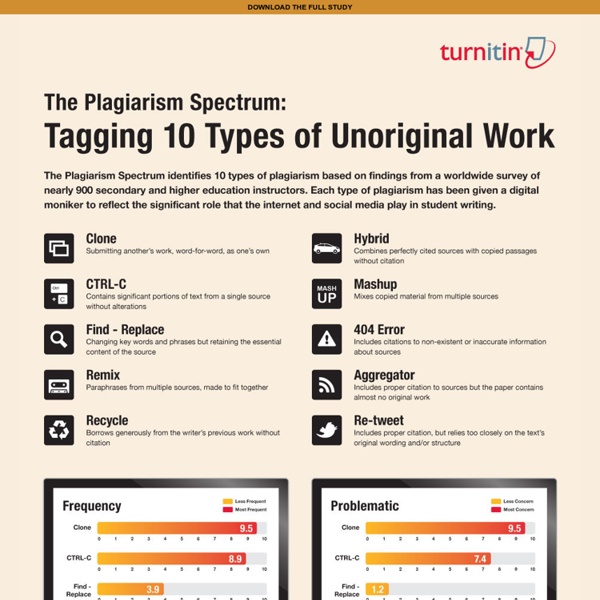



Tips for Teachers: Dealing with Plagiarism — The Learning Scientists 1) Teach students about plagiarism in the classroom, even if they should have "learned it" already. Repetition of information, especially spaced repetition (1), improves learning. Learning about plagiarism is no different. If you teach a class for more advanced students, it is important to remember that students may not have yet mastered the more nuanced issues of academic integrity. 2) Have students go through the Indiana University Plagiarism Training. The Indiana University training program is fantastic for advanced high school students through graduate students. After the tutorial, a certification test is available. Of course, this isn’t the only resource available to learn about plagiarism. 3) Show your students examples of plagiarism beyond just word-for-word plagiarism. As I mentioned earlier, copying an entire paragraph or even paper should be clearly recognized as plagiarism by most students who have had any sort of instruction about plagiarism.
Education World ® - Student Guide to Avoiding Plagiarism Plagiarism is presenting someone else's words or ideas as your own. The following are all examples of plagiarism: Quoting or paraphrasing material without citing the source of that material. Sources can include Web sites, magazines, newspapers, textbooks, journals, TV and radio programs, movies and videos, photographs and drawings, charts and graphs; any information or ideas that are not your own. Quoting a source without using quotation marks -- even if you do cite it. The best way to avoid plagiarism is to take careful notes. You must cite the source of every quote, every paraphrased passage, and every summarized idea you use in a research paper. Sources must be cited both in the body of the paper and in the bibliography. Copy quoted material exactly, enclose it in quotations marks, and name the author immediately before or after the quote. The following tips on the writing process also will help you avoid plagiarism.
How Google Impacts The Way Students Think How Google Impacts The Way Students Think by Terry Heick It’s always revealing to watch learners research. Why do people migrate? Where does inspiration come from? How do different cultures view humanity differently? Literally Google it. And you see knowledge as searchable, even though that’s not how it works. 1. Google is powerful, the result of a complicated algorithm that attempts to index human thought that has been digitally manifest. The result? 2. When students are looking for an “answer,” good fortune sees them arrive at whatever they think they’re looking for, where they can (hopefully) evaluate the quality and relevance of the information, cite their source, and be on their merry way. But with the cold logistics of software, having come what they were looking for, learners are left with the back-button, a link on the page they’re on, or a fresh browser tab. Having found an “answer,” rabid-Googlers are ready to “finish” the assignment. 3. Especially those that seem conflicting.
Search Engine Showdown The Users' Guide to Web Searching Home The Web Library Building a World Class Personal Library with Free Web Resources The Web Library: Building a World Class Personal Library with Free Web Resources Online companion to the book. Frequently updated: last update 8-24-2009copyright Nick Tomaiuolo 2009 Indicates a site that is not discussed in the book. News! about FREE resources Featured: Google Books Magazine Search. Listen to Nick's podcast on searching Google Scholar These web pages are companions to the book The Web Library. World's Virtual Library (80,000+ FREE eBooks, eTexts, On-Line Books, eDocuments) n Welcome! Over the last decade, a quiet revolution has been going on in the development of a large library of "digital" or "electronic" books. While there are still large gaps, a very substantial body of "Western" thought is available in the form of downloadable or on-line books. Here's some of what you will find: n Reference Books: More than 2000 Dictionaries, Encyclopedias, Thesauri, Glossaries, Bibliographies, Chronologies, Timelines, Literary Histories, Biographies, Writing & Style Guides & Student Study aids. nnn Literature & Languages: About 12,000 basic texts in English & American Literature, ranging from Chaucer & other medieval texts to modern, contemporary Fiction & Literature.
Is Google Making Us Stupid? "Dave, stop. Stop, will you? Stop, Dave. Will you stop, Dave?” So the supercomputer HAL pleads with the implacable astronaut Dave Bowman in a famous and weirdly poignant scene toward the end of Stanley Kubrick’s 2001: A Space Odyssey. I can feel it, too. I think I know what’s going on. For me, as for others, the Net is becoming a universal medium, the conduit for most of the information that flows through my eyes and ears and into my mind. I’m not the only one. Bruce Friedman, who blogs regularly about the use of computers in medicine, also has described how the Internet has altered his mental habits. Anecdotes alone don’t prove much. It is clear that users are not reading online in the traditional sense; indeed there are signs that new forms of “reading” are emerging as users “power browse” horizontally through titles, contents pages and abstracts going for quick wins. Reading, explains Wolf, is not an instinctive skill for human beings. Where does it end? Maybe I’m just a worrywart.
Owl's Cabinet of Wonders LibrarySpot.com: Encyclopedias, maps, online libraries, quotations, dictionaries & more. Mirage Bookmark Beautiful Bookmark Exhibition, History of Bookmarks The Online Books Page